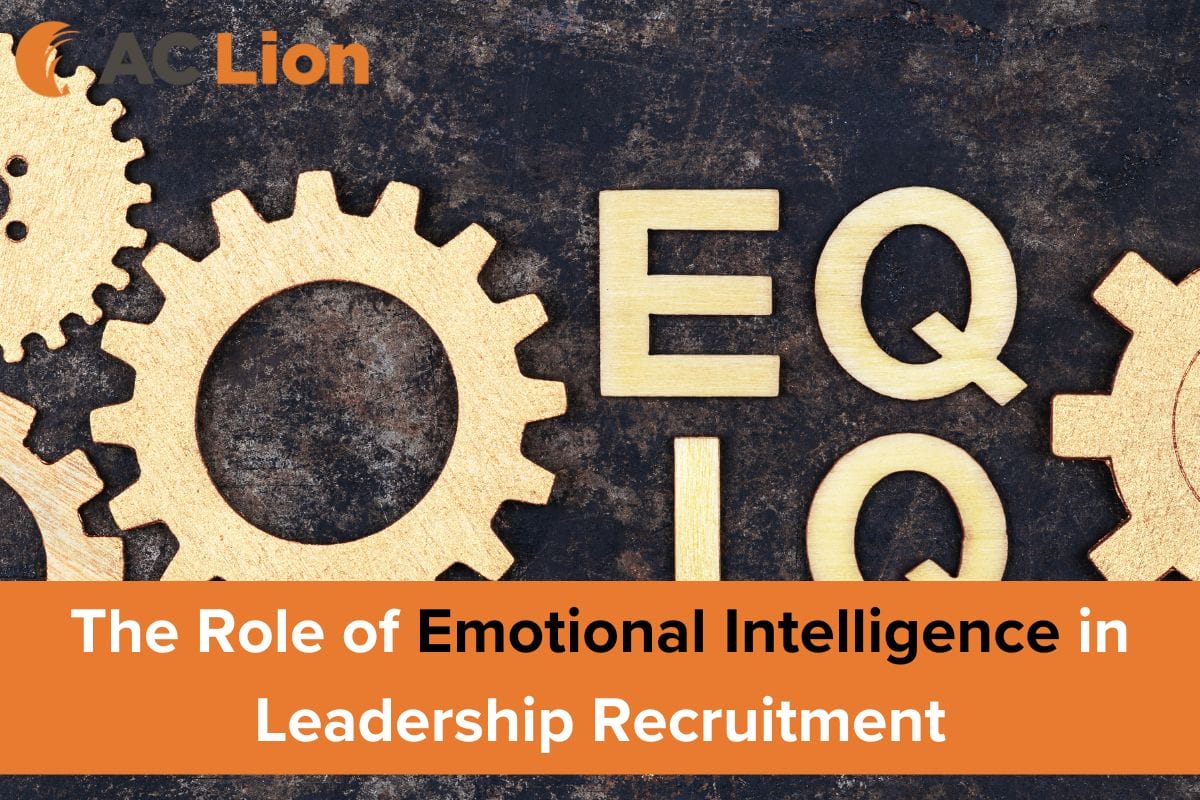The Role Of Emotional Intelligence In Leadership Recruitment


Every human being experiences emotions. But, not everyone is well-equipped to understand, manage, and express those emotions. In his 1995 book Emotional Intelligence, Daniel Goleman set out to establish emotional intelligence, or the ability to recognize and navigate emotions effectively, as a necessary quality in the pursuit of academic, interpersonal, and professional success. Goleman proposed that EI was just as important as IQ, if not even more so.
In the years since Goleman’s initial discussion of emotional intelligence, academic and professional institutions have begun to acknowledge the quality as a valuable asset in leadership roles. This trend aligns with the general shift toward recognizing the importance of soft skills in the workplace, especially interpersonal skills involving teamwork, motivation, and communication. Today, we will examine why emotional intelligence is a necessary leadership quality that should be considered during the recruitment process.
Core Components of Emotional Intelligence
There are 5 core components of emotional intelligence: self-awareness, self-regulation, motivation, empathy, and social skills. Each component has the potential to positively impact team dynamics and decision-making when utilized properly in the workplace, making them effective leadership qualities.
Self-Awareness
Self-awareness enables leaders to better understand themselves. Backed by a deeper understanding of their own emotions, abilities, and biases, leaders can make more effective decisions that benefit the entire workplace. Self-awareness typically augments a leader’s ability to express their emotions as well. An open and expressive leader creates a safe environment for other employees to speak about their own feelings without fear.
Self-Regulation
Self-regulation requires leaders to control their responses to situations and people. Even if they become frustrated or angry, self-regulated leaders avoid outbursts by exhibiting calming behavior that soothes the situation and those involved. This skill keeps internal disputes to a minimum without invalidating the emotions of any employees involved in the disputes.
Motivation
Leaders must be able to motivate and inspire members of their team. Motivation leads to productivity, success, and a sense of accomplishment among employees that boosts the overall mood of the workplace. Team members who are engaged with their work and encouraged by their leaders are more likely to feel fulfilled in their positions.
Empathy
Empathetic leaders create a work environment where team members feel valued and heard. They also set an example for how employees should interact with each other. Active listening is an important empathetic skill that demonstrates interest and attention during conversations, showing employees that their leader genuinely cares about what they have to contribute.
Social Skills
Social skills allow leaders to communicate expectations to employees, give constructive feedback, handle difficult situations, and, most importantly, be supportive. Social competency is a necessary tool leaders use to help their teams get along and meet the expectations of the business.
Emotional Intelligence in the Recruitment Process
In order to have emotional intelligence in leadership recruitment, organizations will have to make emotional intelligence assessment part of the recruitment process. Perhaps the most organic way to go about assessing EI in potential candidates is to sit them down for an interview. Interviewers can choose to ask questions that directly pertain to EI, such as:
- What are your strengths and weaknesses?
- How do you create balance in your life?
- Do you consider your emotions at work?
- Do you value workplace friendships?
- How would you mediate a dispute between team members?
Interviewers should also pay attention to the behaviors candidates exhibit throughout the conversation. Emotionally intelligent individuals may pause to think before answering questions. They will most likely listen intently as well and talk openly about how other people fit into their experiences. They may even ask questions in return.
Emotional intelligence in the workplace is an important measurement for successfully predicting a candidate’s potential as a leader. Traditional metrics like experience and education should still be considered, too, but EI helps differentiate the candidates who have the ability to do their own job while also motivating others to do theirs. Leaders with high EI know how to build a positive workplace culture that inspires others to get more done. These leaders accomplish more for the company than those who only have the technical skills to fulfill the role.
Successful Leaders with High EI
Richard Branson, founder of the Virgin Group, is one of the most famous and successful CEOs of recent times. In a LinkedIn interview, Branson expressed his belief that emotional intelligence is important in every aspect of life, especially business. “Being a good listener, finding empathy, understanding emotions, communicating effectively, treating people well, and bringing out the best is critical to success,” he said. “It will also help you build a business that really understands people and solves their problems, and it will make for a happier and healthier team, too.”
Branson went on to mention that he didn’t allow his IQ or school grades alone to determine his success. Instead, he relied on his soft skills to create an organizational environment that motivated others and himself to work harder. Leaders in any industry can utilize the skills Branson outlined to build a firm foundation of core business values that their team can rely on and refer to as they carry out daily tasks.
The Future of EI in Leadership Roles
The shift to fully remote or hybrid remote work in recent years has made emotional intelligence an even more significant quality in workplace leadership. Teams are often disjointed now, with some members working from home while others come into the office. Leaders need to be able to support remote workers who may feel disconnected or isolated from the rest of the team by finding creative ways to bring everyone together. Weekly meetings and virtual team bonding exercises can be great ways to facilitate communication.
Many remote workers also struggle with work-life balance. Leaders may need to intervene at times to help them avoid burnout while still accomplishing their necessary tasks. In these cases, it’s important for leaders to be empathetic and consider how the workday may look different from a remote worker’s perspective.
No matter how an organization is structured, emotionally intelligent leaders are a must-have in the workplace hierarchy. They have the soft skills necessary to bridge gaps, understand different perspectives, and create a sense of belonging among team members that contributes to a positive and successful organizational culture, even in the light of modern struggles.
